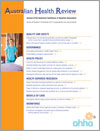
Australian Health Review
Scope & Guideline
Driving Change in Health Care Through Scholarly Discourse
Introduction
Aims and Scopes
- Health Policy and System Reform:
The journal emphasizes the evaluation and discussion of health policies and reform initiatives aimed at improving healthcare access, quality, and efficiency within the Australian health system. - Patient-Centered Care and Consumer Perspectives:
Research highlights the importance of consumer involvement and perspectives in health service delivery, focusing on patient satisfaction, experiences, and engagement in care processes. - Workforce Dynamics and Professional Development:
There is a strong emphasis on understanding workforce trends, retention strategies, and the professional development of health practitioners to enhance healthcare delivery. - Chronic Disease Management and Public Health:
The journal publishes studies related to chronic disease management, public health challenges, and the social determinants of health affecting various populations in Australia. - Innovative Healthcare Delivery Models:
Research on new models of care, including integrated care, telehealth, and community-based services, is a crucial aspect of the journal, aiming to optimize patient outcomes and healthcare efficiency. - Cultural Competence and Indigenous Health:
The journal pays particular attention to cultural competence in healthcare delivery, particularly concerning Aboriginal and Torres Strait Islander peoples, and the need for equitable health services. - Impact of Technological Advancements in Healthcare:
Research on the role of digital health technologies, including telehealth and electronic health records, is a common theme, exploring their implications for healthcare access and quality.
Trending and Emerging
- Telehealth and Digital Health Innovations:
The COVID-19 pandemic has accelerated interest in telehealth and digital health innovations, with numerous studies exploring their impact on access to care and patient outcomes. - Equity and Social Determinants of Health:
There is a growing focus on health equity and the social determinants of health, particularly in relation to marginalized populations, including Aboriginal and Torres Strait Islander communities. - Mental Health and Wellbeing:
Research related to mental health has gained prominence, particularly in the context of the pandemic's impact on mental health services and the importance of addressing mental health in various settings. - Integrated Care Models:
Emerging studies are increasingly exploring integrated care models that encompass multidisciplinary approaches to managing chronic diseases and complex health needs. - Consumer Engagement in Healthcare:
Research on consumer engagement and co-design in healthcare is trending, highlighting the importance of involving patients in decision-making processes and service design. - Sustainability and Environmental Health:
Emerging themes include sustainability in healthcare practices and the relationship between environmental factors and health outcomes, reflecting a broader awareness of climate change's impact on health.
Declining or Waning
- Traditional Hospital-Based Care Models:
There has been a noticeable decrease in research focusing solely on traditional hospital-based care models, as the emphasis shifts towards integrated and community-based healthcare solutions. - Single-Disease Focus Studies:
Research that concentrates exclusively on single diseases is becoming less prevalent, with a growing preference for studies that consider multi-morbidity and holistic approaches to health. - Cost-Effectiveness Analyses of Established Treatments:
There is a waning interest in cost-effectiveness studies of established treatment protocols, as the focus is shifting towards innovative care models and new therapeutic interventions. - Sector-Specific Workforce Studies:
Studies focusing narrowly on specific health profession workforces (e.g., nursing or allied health) are less common, while interdisciplinary and collaborative workforce research is gaining traction. - Public Health Campaigns with Limited Scope:
Research on public health campaigns that target narrow issues without considering broader social determinants is declining, as a more comprehensive approach is being favored.
Similar Journals
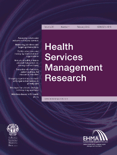
Health Services Management Research
Exploring Innovations in Health Services ResearchHealth Services Management Research is a premier academic journal published by SAGE PUBLICATIONS LTD, focusing on critical areas within the health policy domain. With an ISSN of 0951-4848 and E-ISSN 1758-1044, this UK-based journal has been a valuable resource for over three decades, converging from 1988 to 2024. Recognized for its contribution to the field, it holds a commendable Q2 quartile ranking, positioning it in the top 35% of journals in Health Policy, reflecting its significant impact within the academic community, as evidenced by its rank of 109 out of 310 in Scopus rankings, placing it in the 65th percentile. The journal aims to foster innovative research that addresses the complexities of health services management, making it an indispensable resource for researchers, professionals, and students dedicated to improving health systems. Although it currently does not offer Open Access, the journal remains committed to advancing knowledge and practice in health policy management through rigorous peer-reviewed articles, case studies, and evidence-based analyses.

JAMA Health Forum
Leading the Conversation on Health StrategiesIntroducing the JAMA Health Forum, a premier journal published by the American Medical Association, dedicated to advancing knowledge in the critical fields of health policy and public health. Since its inception in 2020, this open-access journal has emerged as a leading platform for high-quality research, achieving a distinguished Q1 ranking in both Health Policy and Public Health, Environmental and Occupational Health for 2023. With an ISSN of 2689-0186, it provides a vital resource for researchers, policymakers, and students alike, facilitating widespread dissemination of impactful studies that aim to shape health strategies and improve community health outcomes. The JAMA Health Forum not only fosters collaboration among experts but also enhances global discussions on pressing health issues, making it an essential read for anyone involved in health-related research and practice.
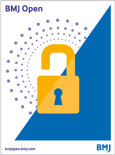
BMJ Open
Connecting researchers and practitioners for better health outcomes.BMJ Open is a distinguished open access journal published by the BMJ Publishing Group, dedicated to advancing the field of medicine through the dissemination of high-quality research. Since its inception in 2011, this journal has positioned itself as a pivotal platform in the medical arena, presently classified in the Q1 category of Medicine (Miscellaneous) for 2023, reflecting its commitment to excellence as evidenced by its Scopus ranking of #117 out of 636, placing it in the top 81st percentile. With its open access model, BMJ Open ensures that research is readily available to a global audience, promoting collaboration and knowledge sharing among researchers, healthcare professionals, and students alike. Located in London, UK, the journal is committed to featuring innovative research that informs clinical practice, public health, and healthcare policy, making it an essential resource for anyone engaged in medical research and practice.
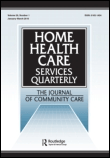
HOME HEALTH CARE SERVICES QUARTERLY
Transforming Health Policy through Rigorous ResearchHOME HEALTH CARE SERVICES QUARTERLY, an esteemed publication by Taylor & Francis Ltd, has been a cornerstone of scholarly discourse in the fields of community and home care since its inception in 1979. With ISSN 0162-1424 and E-ISSN 1545-0856, this quarterly journal promotes rigorous research and innovative practices in home health care services, significantly impacting health policy and public health discussions. The journal enjoys a respectable Impact Factor, reflecting its contributions to the field, and currently ranks Q2 in Community and Home Care, along with Q3 status in both Health Policy and Public Health. Researchers, professionals, and students alike can benefit from the diverse range of articles that address practical challenges and emerging trends within the home health care industry. Although not an open-access journal, it continues to provide a vital platform for advancing knowledge and disseminating best practices essential for improving health outcomes. As it embarks on its journey towards 2024, it remains committed to fostering an inclusive dialogue that shapes the future of home health care.

SAGE Open Medicine
Advancing Medical Knowledge, Openly.SAGE Open Medicine, published by SAGE Publications Inc, stands as an influential open-access journal in the realm of medicine since its inception in 2013. With an ISSN of 2050-3121, this journal facilitates a dynamic platform for the dissemination of rigorous research across a variety of medical disciplines, encompassing extensive topics that range from clinical practice to healthcare policy. Based in the United Kingdom, SAGE Open Medicine has quickly ascended in prominence, achieving a Q2 ranking in the Medicine (miscellaneous) category and securing an impressive placement as #149 out of 636 in the Scopus rankings for general medicine, which places it in the 76th percentile. The journal's commitment to accessibility ensures that researchers, practitioners, and students alike can readily engage with cutting-edge health research that shapes contemporary medical practice. By offering a rigorous peer-review process alongside expedited publication timelines, SAGE Open Medicine remains dedicated to fostering scholarly dialogue and advancing the field of medicine.
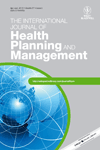
INTERNATIONAL JOURNAL OF HEALTH PLANNING AND MANAGEMENT
Fostering dialogue for impactful health solutions.INTERNATIONAL JOURNAL OF HEALTH PLANNING AND MANAGEMENT is an esteemed publication within the fields of Health Policy and Medicine, published by WILEY, a renowned academic publisher based in the United Kingdom. Since its inception in 1985, this journal has been at the forefront of advancing knowledge and practice in health planning and management, drawing on a diverse range of empirical and theoretical research to inform policy and improve health outcomes. With an impressive impact factor and ranked in the top quartile for both health policy and miscellaneous medicine, the journal is committed to publishing high-quality research that meets the needs of practitioners, policymakers, and scholars alike. Currently, it operates without open access, ensuring that all published articles maintain a rigorous standard of peer review while providing an essential platform for dialogue among professionals in the field. The INTERNATIONAL JOURNAL OF HEALTH PLANNING AND MANAGEMENT continues to play a vital role in shaping health systems and policies, making it an indispensable resource for anyone involved in health research and management.
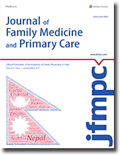
Journal of Family Medicine and Primary Care
Empowering Primary Care with Evidence-Based InsightsThe Journal of Family Medicine and Primary Care is a premier, peer-reviewed academic journal dedicated to the fields of family medicine and primary healthcare. Published by Wolters Kluwer Medknow Publications, this Open Access journal has been providing a platform for the dissemination of valuable research since 2012, offering researchers, practitioners, and scholars unrestricted access to a wealth of knowledge in primary care practices, policies, and innovations. The journal seeks to bridge the gap between academia and practice by publishing original articles, reviews, and case studies that address contemporary issues in family medicine, thereby enhancing patient care and outcomes. With a commitment to advancing the field, the journal serves as an essential resource for those striving to improve the delivery and effectiveness of healthcare services within families and communities.

AMERICAN JOURNAL OF MANAGED CARE
Elevating health policy discourse for a better tomorrow.AMERICAN JOURNAL OF MANAGED CARE is a premier peer-reviewed journal dedicated to the dissemination of research and insights in the fields of health policy and managed care. Published by Managed Care & Healthcare Communications LLC, this esteemed journal has been instrumental in shaping discussions on healthcare management and policy since its inception in 1996. With a 2023 classification in the first quartile (Q1) for both Health Policy and Medicine (miscellaneous), it stands as a significant resource for researchers, professionals, and students seeking to stay at the forefront of healthcare advancements. While this journal does not offer open access, it provides essential content that influences policy formulation and clinical practices across the United States and beyond. With a robust impact factor and a strategic focus on evidence-based methodologies, the AMERICAN JOURNAL OF MANAGED CARE remains committed to fostering a deeper understanding of managed care systems and improving healthcare delivery.

BMC HEALTH SERVICES RESEARCH
Connecting researchers to shape the future of healthcare.BMC Health Services Research is a leading open-access journal dedicated to advancing the field of health policy and services research. Published by BMC since 2001 and based in the United Kingdom, this journal has established itself as an essential resource for researchers, professionals, and students alike, fostering a deeper understanding of health care systems and policies. With an impressive 2023 Q1 ranking in the Health Policy category and a Scopus rank of 90/310, it clearly demonstrates its commitment to high-quality, impactful research. The journal's open-access model ensures that research findings are accessible to a global audience, promoting collaboration and innovation in health services. Spanning from 2001 to 2024, BMC Health Services Research is poised to remain at the forefront of health services research, making significant contributions to policy formulation and practice improvement in the healthcare sector.

Asia Pacific Journal of Health Management
Connecting Ideas for a Healthier Asia-PacificAsia Pacific Journal of Health Management is a distinguished open-access journal published by the Australian College of Health Service Management. Since its inception in 2006, this journal has become an essential resource for researchers, practitioners, and students in the fields of health policy, public health, and health information management. With a commitment to disseminating high-quality research, it operates from Australia, serving as a platform for innovative studies and discussions that address contemporary issues in health management across the Asia-Pacific region. The journal is indexed in Scopus, holding a rank of #228 in Health Policy and #499 in Public Health, indicative of its growing impact, although classified in the Q4 quartile for several categories in 2023. This positions the journal as a valuable resource for understanding health challenges and management practices, promoting a comprehensive understanding of health systems within diverse contexts. Whether you are a seasoned researcher or an emerging scholar, the Asia Pacific Journal of Health Management offers a vital outlet for sharing insights that advance the discipline and improve health outcomes.